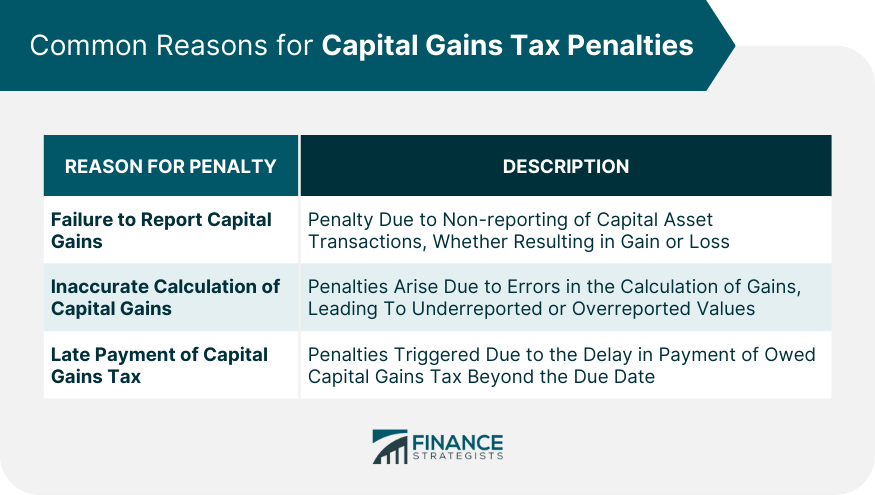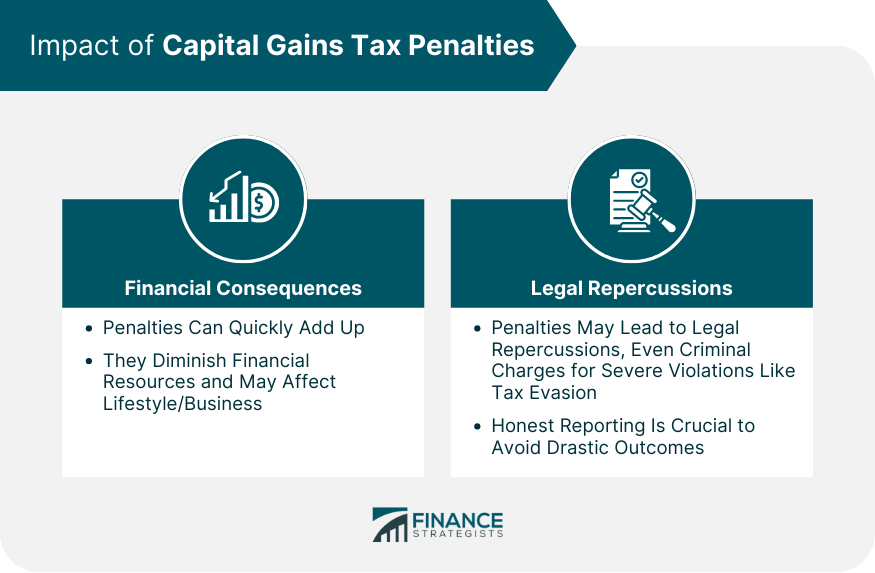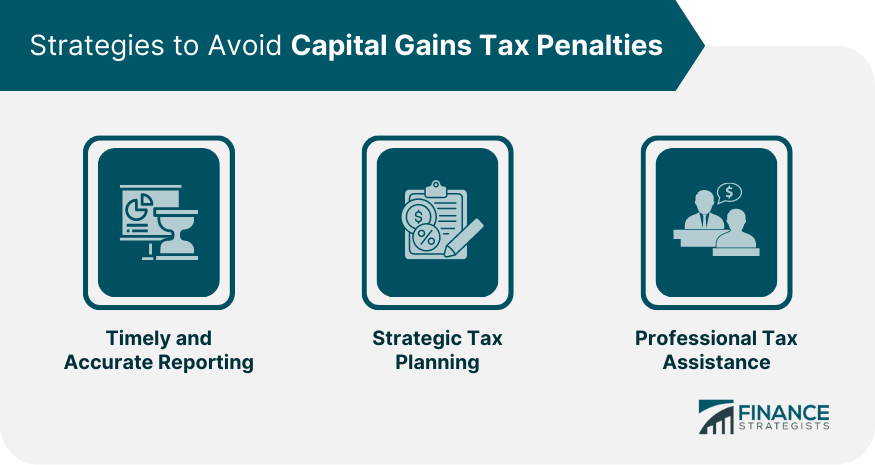Capital gains tax is a type of tax levied on the profits or gains an investor realizes when they sell an asset or investment for more than its purchase price. It applies to assets such as stocks, bonds, real estate, and other forms of property. This form of tax ensures that profits from investments are taxed accordingly, providing a significant revenue source for the government. Capital gains tax plays a significant role in financial planning as it directly impacts the net returns on investments. Informed investors aim to strategically buy and sell assets to minimize the amount of capital gains tax incurred. Thus, understanding the specifics of this tax is pivotal for effective financial planning and wealth management.
Capital gains tax penalties are charges imposed on taxpayers who fail to comply with the IRS rules regarding the reporting and payment of capital gains tax. These penalties can arise from various actions (or inactions) such as underreporting capital gains, late payment, or inaccurate calculations. These penalties serve as a deterrent and enforcement mechanism to ensure compliance with tax laws. Several scenarios may trigger penalties, such as if a taxpayer fails to report capital gains on their tax return or inaccurately calculates the gains. Furthermore, a penalty may also be imposed if a taxpayer pays their capital gains tax after the due date. Awareness of these potential pitfalls can help taxpayers avoid unexpected penalties. One of the primary reasons for incurring capital gains tax penalties is the failure to report capital gains. Every sale of a capital asset must be reported on your tax return, whether it resulted in a gain or a loss. Overlooking or intentionally neglecting to report these transactions can lead to significant penalties, underscoring the importance of diligent and thorough reporting. Another common reason for penalties is the inaccurate calculation of capital gains. The calculation involves deducting the cost basis from the selling price of the asset, and errors can lead to underreported or overreported gains, which can trigger penalties. It's critical to have a good understanding of how to accurately calculate capital gains to avoid these issues. Late payment of the owed capital gains tax is another reason why taxpayers may be penalized. The IRS expects taxes to be paid by the deadline, and failure to do so can lead to penalties and interest charges. Remember, the IRS operates on a "pay as you go" system, and penalties can accumulate quickly on late payments. The most direct impact of capital gains tax penalties is financial. Penalties can quickly add up and become a significant burden, especially when interest charges are factored in. It's essential to understand that these penalties can significantly diminish your financial resources and potentially impact your lifestyle or business operations. Beyond the financial consequences, capital gains tax penalties may also lead to legal repercussions. Serious violations, like tax evasion, can lead to criminal charges. While this is generally reserved for the most severe cases, the possibility underlines the importance of proper capital gains reporting and payment. It's vital to maintain transparency and honesty in reporting capital gains to avoid such drastic outcomes. The IRS sends notices to taxpayers to inform them of discrepancies or issues with their tax returns. These notices often contain complex language and codes that can be difficult to decipher. It's crucial to carefully read and understand the contents of these notices, as they provide information about the problems identified, the penalties imposed, and the steps to remedy the situation. Familiarizing yourself with common IRS notice codes can also be beneficial. Responding promptly and appropriately to IRS notices is important. This typically involves correcting the errors identified, paying the penalty amount (if applicable), or disputing the notice if you believe there's a mistake. Ignoring the notice won't make it go away. Instead, it will likely result in additional penalties. Always ensure to respond to IRS notices within the timeframe mentioned in the notice to avoid additional charges. Navigating tax issues can be complicated. It might be beneficial to seek the assistance of a tax professional when dealing with IRS notices related to capital gains tax penalties. Tax professionals can help understand the issue at hand, respond appropriately to the IRS, and assist in resolving the issue. They have the requisite knowledge and experience to ensure that your rights as a taxpayer are protected. Keeping accurate and organized records of all your financial transactions is crucial. These records can prove invaluable when disputing an IRS notice. Best practices include retaining copies of all tax returns, keeping detailed records of asset purchase and sale, and maintaining documentation of all income sources. Regularly updating and checking these records can save you from potential disputes in the future. The best strategy to avoid capital gains tax penalties is timely and accurate reporting. Ensure to report all capital transactions and accurately calculate capital gains or losses. Using tax software or working with a tax professional can help ensure accuracy. This practice not only keeps you in compliance with tax laws but also helps to maintain a transparent and reliable financial profile. Tax planning strategies, such as holding onto assets for at least one year to qualify for long-term capital gains rates or offsetting gains with losses, can help minimize the capital gains tax liability. It's always a good idea to consult with a tax professional to create a strategy that best suits your financial situation. Strategic tax planning can potentially save significant amounts of money and avoid potential tax penalties. Professional tax assistance can be beneficial in navigating the complex landscape of capital gains tax. Tax professionals have the expertise to guide taxpayers through the intricacies of tax law, helping them comply with regulations and avoid potential penalties. Their assistance goes beyond just tax preparation. They can provide valuable advice on financial planning and asset management, maximizing your investment returns while minimizing tax liabilities. Capital gains tax and the penalties associated with it represent a crucial dimension of financial planning and asset management. An informed understanding of the intricacies surrounding this tax is essential for investors to ensure compliance, minimize liabilities, and achieve optimal investment returns. Notably, errors in reporting, miscalculation, or late payment can lead to severe financial consequences and, in extreme cases, legal repercussions. Moreover, navigating the complex language of IRS notices is paramount, emphasizing the importance of seeking professional tax assistance. Such professionals not only assist in understanding and complying with tax regulations but also offer strategic tax planning to leverage maximum financial benefits. To ensure you are best positioned to navigate the nuances of capital gains tax and avoid potential pitfalls, consider seeking tax planning services. Proactive planning today can save significant financial and legal complications tomorrow.Overview of Capital Gains Tax
Understanding Capital Gains Tax Penalties
What Are Capital Gains Tax Penalties?
Situations Leading to Capital Gains Tax Penalties
Common Reasons for Capital Gains Tax Penalties
Failure to Report Capital Gains
Inaccurate Calculation of Capital Gains
Late Payment of Capital Gains Tax

Impact of Capital Gains Tax Penalties
Financial Consequences
Legal Repercussions

Navigating IRS Notices Related to Capital Gains Tax Penalties
Understanding the Content of IRS Notices
Responding Appropriately to IRS Notices
Seeking Professional Help for IRS Correspondence
Best Practices for Record Keeping and Dispute Resolution
Strategies to Avoid Capital Gains Tax Penalties
Timely and Accurate Reporting
Strategic Tax Planning
Professional Tax Assistance

Final Thoughts
Capital Gains Tax Penalties FAQs
Capital gains tax penalties are charges imposed on taxpayers who fail to comply with IRS rules regarding the reporting and payment of capital gains tax.
Scenarios such as failing to report capital gains, inaccurately calculating gains, or making late payments can trigger capital gains tax penalties.
The impacts of capital gains tax penalties include financial burdens, such as interest charges and potential legal repercussions like criminal charges.
You can navigate IRS notices by understanding their content, responding promptly and appropriately, seeking professional help, and keeping accurate financial records.
Strategies include timely and accurate reporting, strategic tax planning, and seeking professional tax assistance.
True Tamplin is a published author, public speaker, CEO of UpDigital, and founder of Finance Strategists.
True is a Certified Educator in Personal Finance (CEPF®), author of The Handy Financial Ratios Guide, a member of the Society for Advancing Business Editing and Writing, contributes to his financial education site, Finance Strategists, and has spoken to various financial communities such as the CFA Institute, as well as university students like his Alma mater, Biola University, where he received a bachelor of science in business and data analytics.
To learn more about True, visit his personal website or view his author profiles on Amazon, Nasdaq and Forbes.











